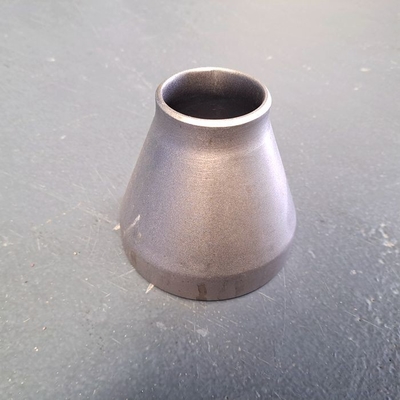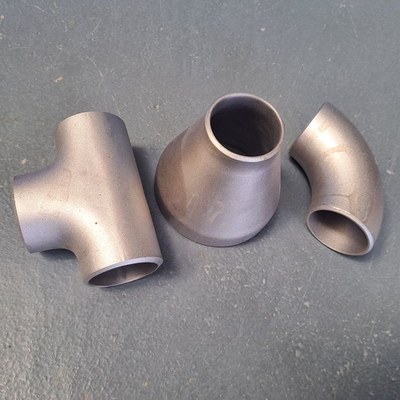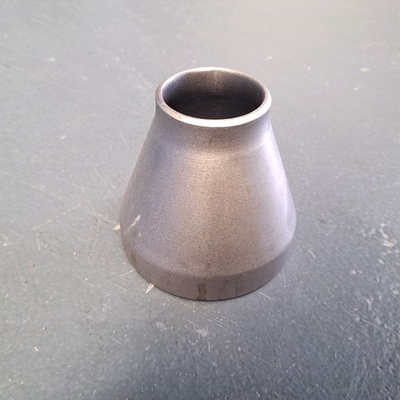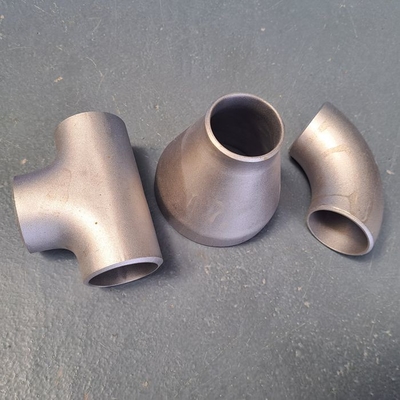-
Titanium Pipe Fittings
-
Titanium Welded Pipe
-
Titanium Pipe Flange
-
Seamless Titanium Tubing
-
Titanium Heat Exchanger
-
Titanium Coil Tubing
-
Titanium Alloy Sheet
-
Titanium Fasteners
-
Titanium Welding Wire
-
Titanium Round Bar
-
Titanium Forgings
-
Titanium Clad Copper
-
Titanium Electrode
-
Metal Sputtering Target
-
Zirconium Products
-
Sintered Porous Filter
-
Shape Memory Nitinol Wire
-
Niobium Products
-
Tungsten Products
-
Molybdenum Products
-
Tantalum Products
-
Equipment Products
-
Aluminum Products
-
Stainless Steel Products
Grade 7 Ti-Pd Eccentric Titanium Reducer On Pipe Joint ASTM B363 For Chemical

Contact me for free samples and coupons.
Whatsapp:0086 18588475571
Wechat: 0086 18588475571
Skype: sales10@aixton.com
If you have any concern, we provide 24-hour online help.
x| Application | Chemical, Petrochemical, Oil & Gas, Power Generation | Key Words | Eccentric Titanium Reducer |
|---|---|---|---|
| Package | Wooden Cases, Wooden Pallet, Etc. | Surface Treatment | Painting |
| Production Standards | ASTM B381, ASME B16.5, And ASME B16.47. | Rolling Process | Hot Or Cold Rolled |
| Technique | Forged And CNC Machined | Color | Bright Silver |
| Highlight | Grade 7 Titanium Reducer,ASTM B363 Titanium Reducer,Pipe Joint Titanium Reducer |
||
Grade 7 Ti-Pd Eccentric Titanium Reducer On Pipe Joint ASTM B363 for Chemical
A reducing pipe is a specialized type of pipe fitting where the cross-sectional radii of the two ends differ.
The deformation characteristic of the reducer involves determining the diameter of the tube billet based on constant volume before and after plastic deformation of the metal material. The tube billet diameter is smaller than that of the reducer. During the deformation process, controlled by the core mold, the inner arc is compressed, compensating for metal movement to other thinned parts due to diameter expansion, resulting in a reducer with uniform wall thickness.
The hot push forming process for concentric reducer pipe formation utilizes a special reducer pusher, core mold, and heating device. The tube billet is set on the mold and moved forward by the pusher while being heated and expanded during the process of diameter and bend forming.
| Type | Material | Specifications | Standard | Technique | Surface Finished | Quality Control | Application |
|---|---|---|---|---|---|---|---|
| Concentric Reducer R(C) | Pure titanium or Titanium alloy, Carbon Steel, Alloy Steel, Stainless Steel, NO2200, NO2201, MONEL400, INCONEL 600, ZR702 | Outer diameter DN15-1200 NPS 1/2"-48", Wall thickness 1-15MM Sch5s-Sch160 | ASTM B363, ASME B16.9, ASME SB363, ANSI B16.9 | Welded, Forged, Rolled, Seamless | Sand blasting, Polishing, Pickling | 100% X-ray detection (RT), 100% Surface penetrant inspection (PT) | Chemical, Petroleum, Machinery, Industry, etc. |
| Eccentric Reducer R(E) | Pure titanium or Titanium alloy, Carbon Steel, Alloy Steel, Stainless Steel, NO2200, NO2201, MONEL400, INCONEL 600, ZR702 | Outer diameter DN15-1200 NPS 1/2"-48", Wall thickness 1-15MM Sch5s-Sch160 | ASTM B363, ASME B16.9, ASME SB363, ANSI B16.9 | Welded, Forged, Rolled, Seamless | Sand blasting, Polishing, Pickling | 100% X-ray detection (RT), 100% Surface penetrant inspection (PT) | Chemical, Petroleum, Machinery, Industry, etc. |
Chemical Composition of ASME B16.9 WPT7 Ti-0.2Pd
| N | C | H | Fe | O | Al | V | Pa | Mo | Ni | Ti | |
| Gr 7 | 0.03 | 0.08 | 0.015 | 0.30 | 0.25 | / | / | 0.12~0.25 | / | / | balance |
Tensile Requirements of ASME B16.9 WPT7 Ti-0.2Pd
| Grade | Tensile strength(min) | Yeild strength(min) | Elongation(%) | ||
| ksi | MPa | ksi | MPa | ||
| 7 | 90 | 620 | 70 | 438 | 15 |
Characteristics of Titanium Pipe Fittings
Titanium, being a rare metal, is processed into various products to meet specific requirements, with titanium pipe fittings being one such product. The key characteristics are as follows:
1. Corrosion Resistance: Titanium pipe fittings excel in wet air and seawater environments, exhibiting significantly higher corrosion resistance compared to stainless steel. They demonstrate robust resistance to pitting, acidic, and stress corrosion.
2. Excellent Low-Temperature Resistance: Titanium alloys maintain their mechanical properties even at low temperatures.
3. High Strength: With a density of approximately 4.51g/cm³, titanium alloys are around 60% lighter than steel. The specific strength (strength/density) of titanium alloys surpasses that of other metal structural materials by a considerable margin.
4. Superior Thermal Strength: Titanium pipes can endure prolonged exposure to temperatures up to 450°C while retaining their strength. Conversely, aluminum alloy's specific strength diminishes at 150°C. Titanium alloys operate effectively at temperatures below 500°C, whereas aluminum alloys operate below 200°C.
5. Smooth Surface: Titanium pipe fittings boast a smooth surface devoid of scaling layers, significantly reducing scaling coefficients. Their strength surpasses that of high-quality steel, showcasing excellent heat resistance, low-temperature toughness, and fracture toughness. Primarily, titanium products find applications in aircraft, rockets, missile structures, and titanium fixation devices.






